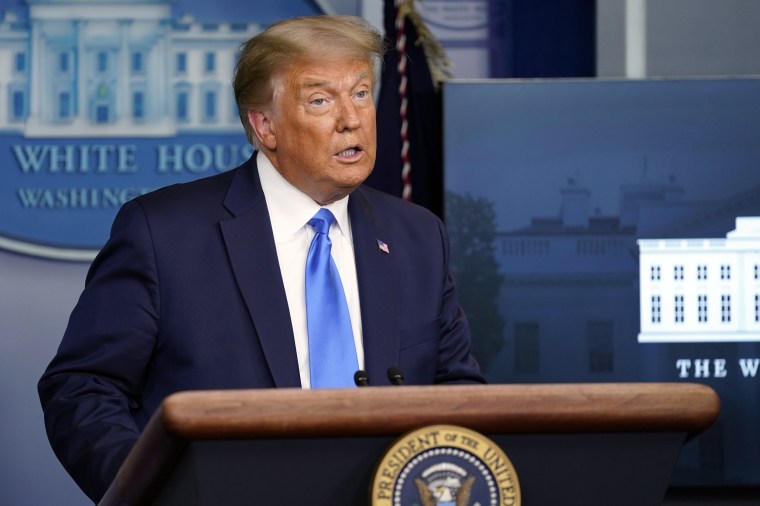American presidents aren't traditionally asked whether they'll commit to a peaceful transition of power, because the question is generally seen as unnecessary. It's simply assumed that in the United States, chief executives, regardless of party, will respect and honor the foundations of our democracy. For generations, few thought to ask because the answer was self-evident.
In 2020, that's no longer the case. In light of Donald Trump's overt hostility toward democratic principles, the question has become necessary -- and as the Republican reminded the world yesterday, his perspective on this is chilling to those who want to see the American experiment survive.
President Donald Trump was asked Wednesday whether he would commit to a peaceful transfer of power should he lose this fall to Democratic presidential nominee Joe Biden. The president declined to do so.
"Well, we're going to have to see what happens," Trump said in response to a direct question about a possible peaceful transition of power. "You know that I've been complaining very strongly about the ballots, and the ballots are a disaster."
Pressed further, the Republican added, "We want to have -- get rid of the ballots and you'll have a very -- we'll have a very peaceful -- there won't be a transfer, frankly. There'll be a continuation. The ballots are out of control."
With Election Day just 40 days away, with millions of Americans already casting their votes, the sitting American president believes that the key to him maintaining power is to "get rid of the ballots."
To the extent that reality still has any meaning, "the ballots" are not "a disaster." They're also not "out of control." Trump appears to be referring to a common process in which voters register their preference by mailing their ballots to election officials, instead of voting in person. If the White House has any evidence of flaws in this system, it's kept that information well hidden.
It's also worth noting for context that the president hasn't always maintained this posture. In early June, Trump sat down with Fox News' Harris Faulkner, who asked whether the president would agree to voluntarily exit the White House if the election doesn't go his way.
Trump responded, "Certainly, if I don't win, I don't win." The Republican added that if he comes up short, "you go on, do other things." A Politico report added at the time, "Though the president has never given any serious indication that he might not leave office if he were to lose re-election, his comments aired Friday appear to be the first time he has publicly committed to doing so."
The Republican's commitments, however, have since changed. Nearly four months after saying he'd accept a defeat, Trump is now raising the prospect of disqualifying ballots he doesn't like, guaranteeing "a continuation" of power, regardless of the wishes of his own country's citizens.
It's against this backdrop that The Atlantic published a breathtaking report from Barton Gellman, describing a scenario in which Republican state legislators in key states may decide to nullify voters' wishes and dispatch Trump supporters to the electoral college, even if the Democratic ticket wins their state.
Gellman spoke to three Republican leaders in Pennsylvania, who told him "they had already discussed the direct appointment of electors among themselves, and one said he had discussed it with Trump's national campaign."
Trump has also spoken publicly about turning to the federal courts to help keep him in power.
Trump has also spoken publicly about his supporters voting twice.
Trump has also spoken publicly about his interest in delaying U.S. elections.
Trump has also spoken publicly about his belief that he's entitled to more than two terms in office.
Trump has also spoken publicly about his lawsuits intended to make it more difficult for Americans to participate in their own elections.
Trump has also publicly questioned the legitimacy of any election in which he loses.
When some make the case that democracy itself is on the ballot in 2020, it's more than just an election-year slogan. It's a warning about a legitimate threat to our system of government.

